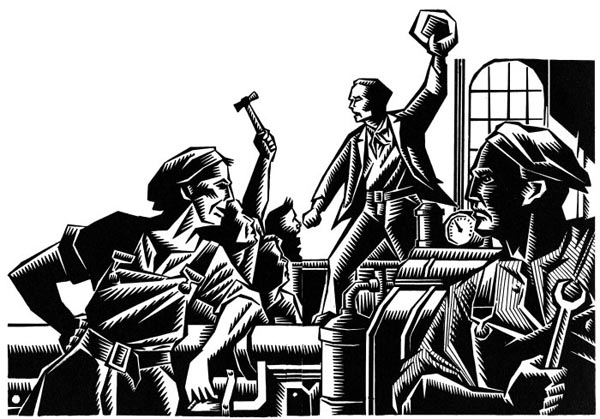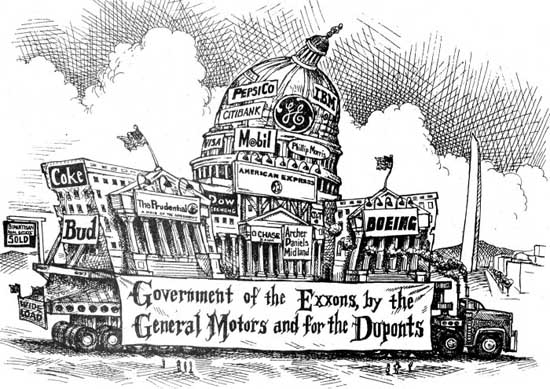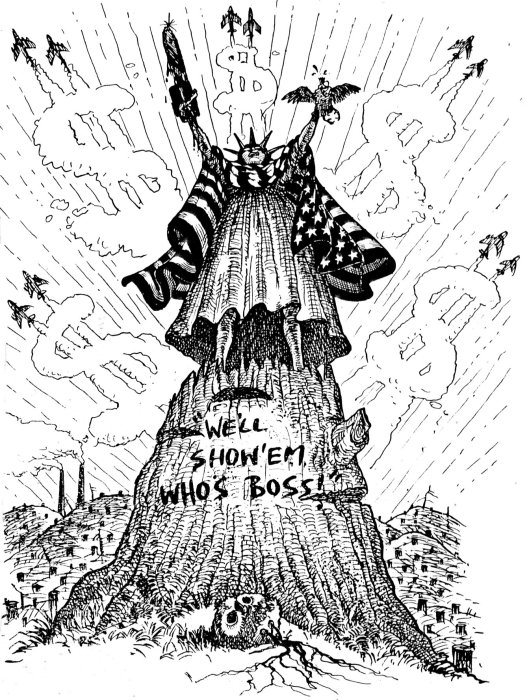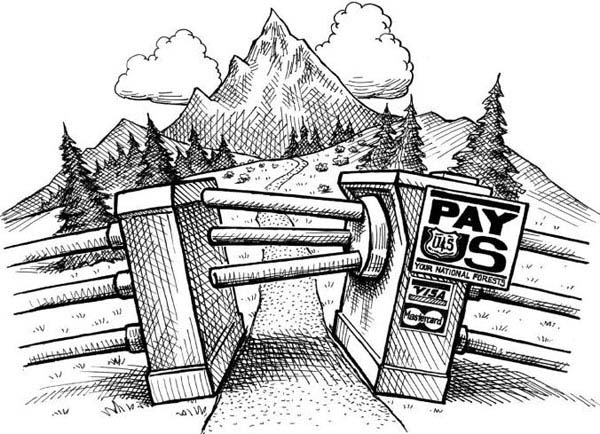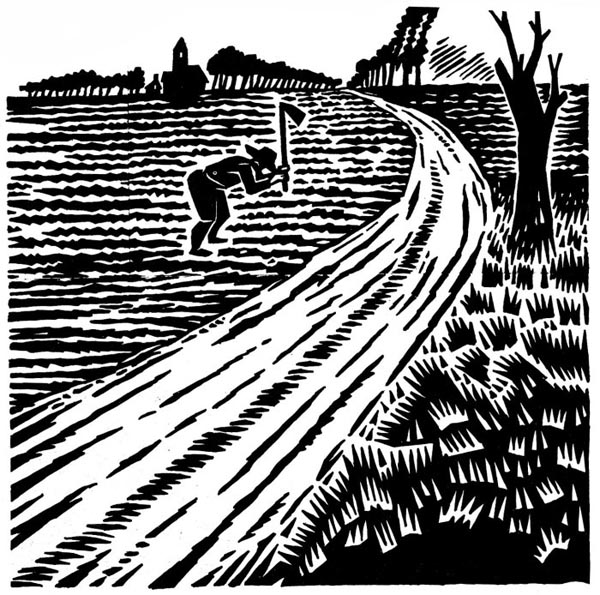|
|||||||||||||
Anarcho-Syndicalism versus On Land and Work
Letter #01
Greetings, Among the Founding Principles of the America First Party, there was one line that particularly stood out: "Rebuild our manufacturing base and protect American workers." It is most interesting because it is the only sentence where the word "worker" appears. There seems to be a much greater interest in preserving business in America, with principles such as, "Help American businesses stay in America" and "Promote a Buy American policy." There is a two-fold difficulty in "rebuilding our manufacturing base" as a means to "protect American workers." First, as technology becomes more and more efficient, workers are going to be producing more and more out their labor. That means that the employers and businesses will have a lesser use for their workers, and -- ultimately -- it leads to low-wages from competition among workers, and high rates of unemployment. Lower wages and unemployment: unless you cut technological progress down, this is going to be the only result you get in a Capitalist society. Second, the manufacturing base has moved all over the world, where laborers in China and Africa and South America produce the bulk of our consumer products. If the US industrial sector started to grow again, it would be a disaster. In some countries, like Burma, laborers receive two bowls of rice for their daily labor. Inhumane, of course, but how are American laborers going to compete with that? And if they cannot, then the industrialized sector will be unable to market these expensive products. Because in a free, world market, other countries are going to buy the cheapest that is out there. We wouldn't be able to supply manufactured products at such unbelievably low rates. But independence and prosperity are still things we can create, even when the world around us shows challenging obstacles. We both agree in the ambition, willingness, and preservation in the spirit of the American worker -- our tenacity, our grit, our passion, and our hope in something better for our families. And yet, all around us, there are empty fields, and idle factories. At one point these iron mills ran all day, and gave utility to the value dug up from the earth's core. But now, they only manufacture rust, and their primary export is unemployed, poor, and dispossessed families. The problem is not with the American workers, it is with the American Capitalist! It is the capitalist class that owns these lands, that possesses these factories. Even if some profit could be made, it is not enough to attract them. If investing in America gets you a 20% return, and investing in China gets you a 35% return, I don't have to tell you where investors will go. But, unfortunately, the American worker can't just pick-up-and-go to the next job, three continents away. We both want to have farmers in those fields, and food in those stores. We want the people to be provided with a means by which they can work for themselves, support themselves, and possess a real type of independence. I want these factories back up and running, where the needs of our lives can be produced, where workers can make a decent living to bring back to their families. And yet... these lands, these empty and idle lands, are surrounded by "no trespassing" signs. If you want to give work to our people, then give them the lands! You're not going to end poverty, homelessness, war, ignorance, hate and bigotry when the common people can't provide for themselves. You can't make America "strong and proud" when those who build it have absolutely nothing. Give the land to the workers, in free, associations of worker cooperatives. The Capitalists certainly don't need the land, since they're busy exploiting industrial workers in other nations. Give it to us, and with that kind of opportunity, to be our own real masters of our lives -- with that, no American will be hungry again. I await your response, thank you... Sincerely,
Letter #02
Hello, I fear that you do not share the same respect for property that our nation's founders held to. We believe that the source of the economic distresses in our society flow from government misconduct at all levels, particularly in the expansion of the scope and size of the government. The vexatious taxation, coupled with the creation of a counterfeit currency to sustain a corporate and personal welfare state, has forced our economy to a position of imbalance and skewer that negatively impacts vitality and prosperity. On a practical level, the cost of production is not, these days, the price of the land itself. It is the constant investment in intellectual property development, new technology, and labor costs. There is plenty of cheap land in America - that is not the problem. The problem is the abusive regulation and taxation that suffocates enterprise. Most of these government impediments are unlawful and should be rolled back. That is what the AFP advocates as part of the solution to the issues you raise. Thanks for writing. John Pittman Hey
Letter #03
Greetings, Thank you so much for responding to my letter. I was really quite thrilled when I had found your reply waiting in my inbox.
There seems to be some problem in this reasoning. I do not see how both "corporate welfare" and "vexatious taxation" create the economic problems that we have today. In one case, wealth is being taxed from the industries. But in many more cases, it is given back, in services and subsidies -- it goes right back to the pockets of the Capitalist. In the European Union, 40% of agriculture survives on subsidies, just as the USDA spent $13 billion on subsidies in 2006 alone. [*1] Police departments and district attorneys are more concerned with prosecuting a $2 shoplifter than they are in prosecuting a $40 million dollar, corrupt CEO. And when the US military lands in a third world nation, our market is flooded with the products of their cheap labor, and tax dollars go to the highest bidder for land development. Our government will kill in a foreign war, and it is the common worker who pays for it with their life. Those in the war suffer miserably, but the wealthy industrialist makes billions off of weapons and land contracts. It sounds very unreasonable to say that it is this government, which murders and enslaves for the Capitalist, that is also trying to destroy the Capitalist. This is far from the problem being "abusive regulation and taxation that suffocates enterprise." In fact, if our present government will start wars and annex land for "enterprise," I don't see it as being the greatest problem to Capitalism living forever. Nor could I see "helping out the Capitalist even more" as being a solution to getting jobs to American workers.
The development of intellectual property and new technology would be no difficulty if we were to take land, and allow workers to labor it. And, if we were to give them the fruit which they pulled from the earth, this would cover labor costs. The only difficulty would be arranging for labor costs to be provided before the harvests become eventually succesful. From an "America First Party," I could see no objection to American men and women, working the ground for themselves, and making value out of it. It increases the gross domestic product, gives work to laborers, and helps provide for the nation's communities. I could imagine no serious opposition to starting and experimenting with this type of Socialization.
This particularly line also struck me a little funny. Our country's principles -- are they not based on John Locke, Jean Jacques Rousseau, and other Enlightenment figures? Last I recall, Locke said an individual only has the right to property when "at least where there is enough, and as good, left in common for others." And elsewhere, "...land that is left wholly to nature, that hath no improvement of pasturage, tillage, or planting, is called, as indeed it is, waste." [*2] And waste, when it is taken from the common, is theft from the people. There is little else I can see, except waste, when I am looking at all these empty fields and these idle factories -- these economic forces are waiting to spring forward, and their industry will lift us to prosperity, but only where all can benefit from it. Instead, this private property has become our social burden. If you're talking only about those in the American Revolution, then there are plenty with similar ideas. Thomas Paine wrote in response to the prevailing Capitalist system, "The present state of civilization is as odious as it is unjust. It is absolutely the opposite of what it should be, and it is necessary that a revolution should be made in it. The contrast of affluence and wretchedness continually meeting and offending the eye, is like dead and living bodies chained together." [*3] And this is exactly what I want -- agrarian justice, or justice of the land! But instead, the possession of property by a few elite has been enough to disenfranchise the majority of the common people. We have been forced into hunger, poverty, unemployment, and homelessness, by this wretched system. Our founding fathers were right -- if a human being doesn't have an equal opportunity to make wealth, then they will be subjugated, left in squalor and poverty. When Stalin destroyed personal and collective farms in Ukraine and amalgamated them into his government, the people suffered a most brutal famine. Imagine that happening here -- except instead of Stalin, it is a small class of wealthy industrialists. And to stop starving in their own country, they would only have to open up their fields! It seems unimaginable that a small, elite group of landowners would be running our government and our society, and in contradiction to the principles of our Founding Fathers. And, on top of it, the America First Party defends it -- the massive support of the state for the Capitalist class has, in fact, been called, "vexatious taxation" that "suffocates enterprise." It appears to me, in fact, to be quite the opposite. Thank you for your time. If you could respond, I'd be very interested to hear your ideas. Andy Carloff, Resources 1. Environment Working Group's Farm Subsidy Database, http://farm.ewg.org/ , United States, 2006, Subsidy recipients 1 to 20 of 1,446,280: total of $13,405,000,000 in in 2006.
Letter #04
The corporate welfare and the regulation and taxation do not necessarily work symmetrically. In other words, the large multi-national corps benefit from the corporate welfare, yet the regulation and taxation do not harm them as greatly as they harm middle and smaller businesses. This asymmetric impact drives mergers and conglomeration to larger and larger multi-national corporations. They use their power with government to skew the marketplace their direction away from the smaller fish. Our government most certainly does support welfare capitalism at the expense of free enterprise. This is the way with all fascist-leaning governments. Governments who start wars and annex lands for enterprise are not supporting Free Enterprise. They are supporting a fascist-leaning welfare-state / capitalism that squashes the little people and smaller enterprises to the benefit of the government dependants: welfare recipients (individual and corporate). I hate to break it to you, but there isn't much net profit in tilling the soil. There is plenty of cheap land available for folks who want to truck farm or operate small farms. But that is a very hard way to make it these days, because productivity is enhanced with investment in machinary, etc. - in farming, it is the cost of machinary, fuel, and fertilizer that dominates - the labor cost has largely been squeezed out by mechanization. Even then, the return on investment is often lower than in the bond or stock markets. Most people won't work on the land to grow things, because the labor is hard, the profits are thin, and welfare is easier to collect and live off of. The founders did hold property involate, and they would be appalled at the tax rates levied these days. We pay anywhere from 30 to 50% in taxes on everything we make. That is what we mean when we say that property must be defended. We are not only speaking of real estate. "Property" includes the possessions of man - which includes wages, physical assets, investments in stocks, interest earnings, etc. The defense of property includes the barring of vexatious taxation. There is plenty of land out there, cheap. People just don't want it that badly. The reason we do not have an "agrarian" society anymore is that people don't like the lifestyle. There is plenty of farmland that people could live on if they liked. JPH--
Letter #05
Greetings, again,
The people don't need profit: they need food, shelter, and to provide these things for their families. The Capitalist creates enterprises because of their want of profit; for them, it is about buying the next limo, or vintage champagne, or caviar. The businessman seeks to give himself luxury, the common worker seeks to feed their family. If a Capitalist has no incentive to profit in developing an enterprise, then they'll put their money elsewhere. But for the worker, they have every single interest in maintaining the enterprise, in preserving wages and employment. The callouses on our hands prove it, the sweat on our brow, the dirt on our face -- we willing and whole-heartedly accept our labor. But this is because it provides for our families and our communities.
Farming isn't the only thing people can do on land. It seems that having a bit of earth is required for any business venture, from restaurants and cafes to corporate headquarters. Many American workers are happy just to earn between $30,000 and $60,000 annually. Whether manufacturing or agriculture, office work or the services industry, the industries are capable of providing these wages. The only reason Capitalists do not invest in them is because there is greater profit to be gained elsewhere. The problem with providing jobs is that we want to work, but those who own the land do not want us to work. Where the interest of the Capitalist rules, businesses are going to keep immigrating to oppressive, third-world nations. But if we were to give land and industry to the workers, we would have every interest in keeping it here. As an American worker, I can finally say that the land I work is mine, the fruit I pull from it is mine -- whether it's a farm, or a tavern. My children may end up working in the same exact spot that I'm in. My community only thrives because I work. For every reason imaginable, the person with the most interest for socially-healthy industry is the laborer. To be laid off is the most undignified thing to do to a laborer. It is the Capitalist saying, "To keep operating this business could provide for you and your family. But it doesn't provide enough for my caviar and wines. We are forcing you out of your job, even though the land will be vacant and idle instead." I do not want to labor against the Capitalist -- I want to labor against the land, to pull from nature what my work can create. Give the workers the land, and we'll treat it like we're borrowing it from our children. But if you give it to the Capitalist instead, they'll treat it like something to exploit for their personal desires.
Examine the Seattle General, [*1] the Minneapolis Teamsters Strike, [*2] the West Coast Waterfront Strike of 1934, [*3] or the Toledo Auto-Lite Strike. [*4] In every example, the US military and police attack, beat, imprison, and shoot at non-violent workers. If the workers were allowed freedom of contract, then they would be allowed to collectively bargain for the land. The land already belongs to us workers, and the possession of it by the Capitalist class is nothing more than theft. We would have been the masters of our own fates -- if there was such as thing as property rights and the right to contract. True property rights means giving property to its rightful owner. The workers were perfectly organized into unions and strikes to bargain with the Capitalist class for the land. But they were slaughtered in broad day light. It is a tremendous injustice when the Capitalist owns land only because the government killed non-violent, peaceful workers. To keep the workers away from what already belongs to them seems to be an extreme violation of property rights. Thank you, again, Andy Carloff, Resources *1. Brecher, Jeremy. Strike! Revised edition. South End Press, 1997. ISBN 0-89608-569-4.
|

